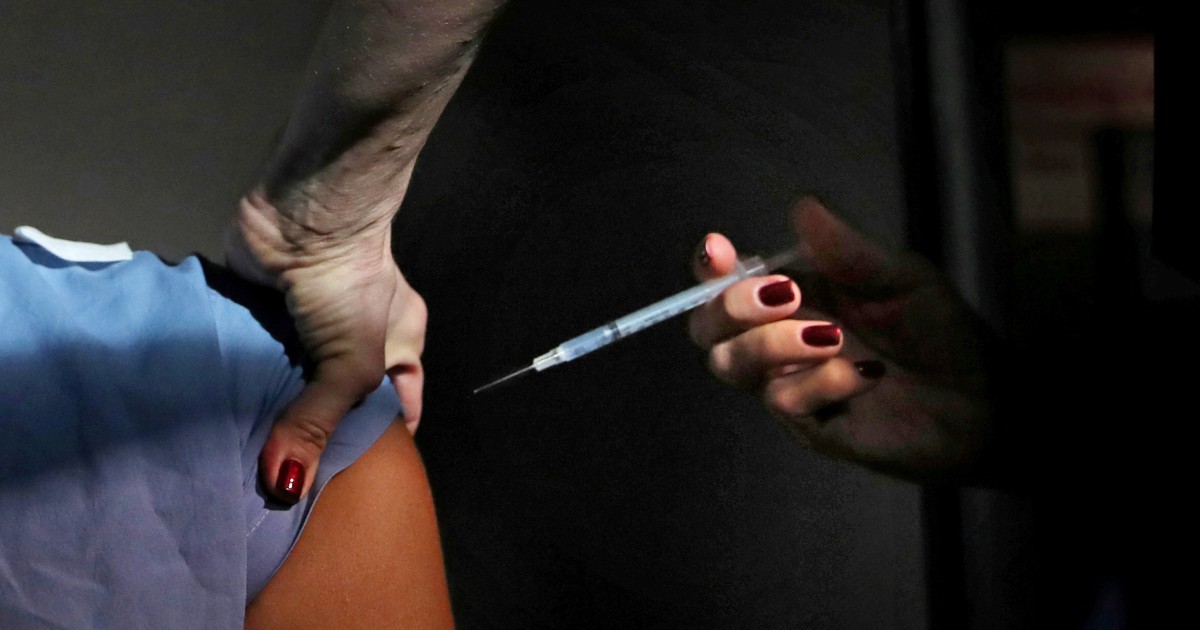
The U.S. is still weeks away from getting new Covid booster shots, even as more people are not only becoming infected with Covid, but getting sick enough to be hospitalized.
The most recent week-to-week data from the Centers for Disease Control and Prevention show a 21.6% increase in hospital stays related to Covid. The increase is far below what the nation has previously endured, however. The current level of Covid hospitalizations is a third of what it was a year ago.
There are a few new virus variants that scientists are paying attention to because they appear to be changing in ways that might make the virus more contagious. It’s not known whether the boosters will be as effective against those variants.
Despite the uptick in Covid, there is no talk of reinstating mask mandates this fall, the CDC told NBC News.
The updated Covid vaccine booster is expected to be cleared by the FDA ahead of a CDC vaccine advisory panel, which is scheduled to meet on Sept. 12 to vote on whether to recommend the updated vaccines.
Some doctors want the boosters faster.
“What are they waiting for? They need to step up their game now, and get the booster out ASAP to the public,” said Dr. Hugh Cassiere, director of critical care services at South Shore University Hospital, part of Northwell Health in New York.
Dr. Michelle Taylor, director of the Shelby County Health Department in Tennessee, said people in her area are paying attention to the rise in Covid.
“When I go out into the community and I talk to people, all they want to know is when we’re rolling it out,” Taylor said, referring to the new Covid boosters.
What’s the right time to get the Covid booster?
Officials maintain that they are working fast enough and carefully enough to ensure that the mid-September rollout of the boosters will be effective.
“Our goal is to release and recommend the vaccine so that it can coincide as much as possible with the peak of the season,” Dr. Nirav Shah, CDC’s principal deputy director, said in an interview.
The peak in Covid spread, Shah and others guess, may occur in November or December.
“Theoretically, if you vaccinate a lot of people too early, and their immunity wanes even by a couple of percentage points, the peak of the season could have far more significant consequences.”
“There’s an art to it, as well as a science,” Shah said.
Even if the first shots are given as soon as CDC Director Dr. Mandy Cohen signs off on them, it could be an additional two weeks for people to develop full protection.
The timeline doesn’t sit well with Cassiere, who worries that a combination of kids back in school, workers back in the office and Jewish holiday gatherings in mid-September will lead to additional increases in viral activity.
“This is the perfect setup for a huge spike that will lead right into the winter,” he said.
Covid booster shots were rolled out earlier last year, around Labor Day, in an attempt to curb surging cases of the omicron subvariants BA.4 and BA.5. Those vaccines were released before they were tested in humans.
This year is different. Covid cases are significantly lower, and the shots must go through additional testing and scrutiny to be fully licensed.
The Food and Drug Administration is currently working with vaccine manufacturers to “ensure the updated vaccines meet the agency’s rigorous standards for safety, effectiveness and quality,” an FDA official said during a phone briefing Thursday. The officials spoke on the condition that their names not be used.
It is expected that the FDA will greenlight the boosters before Sept. 12, because the CDC’s vaccine committee, the Advisory Committee on Immunization Practices, or ACIP, can only meet after the FDA gives its OK.
“Our intention,” one official said on the call Thursday, “is to have the ACIP meeting in as close as possible succession to FDA action as possible.”
CDC’s Shah added that the vast majority of Americans are heading into this next Covid season with some level of immunity, either from prior infection, prior vaccines or both.
“That vaccine that you’ve got on board is still offering protection,” Shah said. “It’s not that the vaccine has been vanquished from your system.”
Dr. Julie Morita, executive vice president of the Robert Wood Johnson Foundation and former head of the Chicago Department of Public Health, agreed that the nation is in a “much different place than we were previously,” and encouraged Americans to get the vaccine whenever it is eventually released.
“These vaccines will help prevent serious disease,” Morita said. “I’m hopeful that when the vaccines are available, people will take full advantage of them.”
What about new subvariants?
The boosters will target omicron subvariants, which continue to morph in ways that, presumably, make the virus more contagious. EG.5, nicknamed “Eris,” is now the predominant subvariant that officials are monitoring.
And the subvariant BA.2.86 has some experts concerned because of its unusually large number of mutations.
How will those changes affect the boosters?
“It’s too early to know for sure,” a federal public health official said on Thursday’s call, “but I think we feel comfortable in saying that it’s likely that the vaccine will help protect against severe outcomes.”
Moderna, one of the Covid vaccine makers, earlier this month said that preliminary clinical trial data showed the updated booster seemed to work against omicron subvariants.
BA.2.86 has been detected in several countries, including the U.S. But spread remains extremely low — for now. If the subvariant does increase in the coming weeks, the timing of our boosters “could end up being perfect,” said Dr. Kavita Patel, an NBC News medical contributor. “That’s the game all of us are playing.”
Follow NBC HEALTH on Twitter & Facebook.






